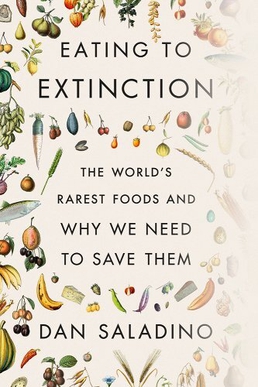Eating to Extinction
Eating to Extinction is a critical examination of the global food industry and its impact on biodiversity, focusing on how the current practices of agriculture, fishing, and food production are leading to the loss of numerous species and varieties of plants and animals. This topic delves into the consequences of relying on a narrow selection of crops and livestock for food, which not only threatens the genetic diversity necessary for the resilience of food systems but also diminishes the cultural heritage associated with traditional diets and culinary practices.
Overview[edit | edit source]
The concept of Eating to Extinction highlights the paradox of the modern food system, which is capable of producing food in unprecedented quantities but often at the cost of ecological and genetic diversity. Industrial farming practices, characterized by monocultures and the extensive use of chemicals, have led to soil degradation, water scarcity, and a decline in pollinator populations. Similarly, industrial fishing practices have depleted fish stocks and disturbed marine ecosystems. This reduction in diversity makes food systems more vulnerable to pests, diseases, and climate change, posing a significant risk to global food security.
Causes[edit | edit source]
Several factors contribute to the trend of eating to extinction, including:
- Economic Efficiency: The focus on a few high-yielding varieties of crops and livestock breeds is driven by the desire for economic efficiency. These varieties often require less labor and are more predictable in terms of yield and quality, making them more attractive to large-scale producers.
- Globalization: The global food market favors uniformity and standardization, which leads to a concentration on a limited number of species that can withstand long-distance transportation and have a longer shelf life.
- Loss of Traditional Knowledge: The decline in traditional farming and culinary practices, partly due to urbanization and the changing lifestyles, contributes to the loss of knowledge about diverse species and varieties that were once integral to diets.
Consequences[edit | edit source]
The consequences of eating to extinction are far-reaching, affecting not only the environment but also human health and cultural diversity. The loss of genetic diversity in food crops and animals makes it harder to adapt to changing environmental conditions and new diseases. Moreover, the reliance on a narrow range of food sources contributes to a lack of nutritional diversity in diets, which can lead to health problems. From a cultural perspective, the disappearance of traditional food species and varieties erases part of humanity's cultural heritage, including culinary traditions and languages.
Solutions[edit | edit source]
Addressing the issue of eating to extinction requires a multifaceted approach:
- Promoting Agricultural Biodiversity: Encouraging the cultivation and consumption of a wider variety of crops and livestock can help preserve genetic diversity and enhance food security.
- Supporting Small-scale Farmers and Fishers: Small-scale producers often maintain diverse varieties and breeds. Supporting them through fair trade and sustainable practices can contribute to the conservation of biodiversity.
- Educating Consumers: Raising awareness about the importance of biodiversity for food systems and encouraging dietary diversity can shift demand towards more sustainable options.
- Policy and Regulation: Implementing policies that promote sustainable farming and fishing practices, protect indigenous rights, and regulate the use of chemicals in agriculture can help mitigate the impact of industrial food production on biodiversity.
Conclusion[edit | edit source]
The challenge of Eating to Extinction is a complex issue that requires the cooperation of governments, producers, consumers, and the global community. By valuing and preserving the diversity of our food sources, we can ensure a resilient and sustainable food system for future generations.
| Eating to Extinction Resources | ||
|---|---|---|
|
| |
Translate to: East Asian
中文,
日本,
한국어,
South Asian
हिन्दी,
Urdu,
বাংলা,
తెలుగు,
தமிழ்,
ಕನ್ನಡ,
Southeast Asian
Indonesian,
Vietnamese,
Thai,
မြန်မာဘာသာ,
European
español,
Deutsch,
français,
русский,
português do Brasil,
Italian,
polski
Navigation: Wellness - Encyclopedia - Health topics - Disease Index - Drugs - World Directory - Gray's Anatomy - Keto diet - Recipes
Search WikiMD
Ad.Tired of being Overweight? Try W8MD's physician weight loss program.
Semaglutide (Ozempic / Wegovy and Tirzepatide (Mounjaro / Zepbound) available.
Advertise on WikiMD
WikiMD is not a substitute for professional medical advice. See full disclaimer.
Credits:Most images are courtesy of Wikimedia commons, and templates Wikipedia, licensed under CC BY SA or similar.Contributors: Prab R. Tumpati, MD


